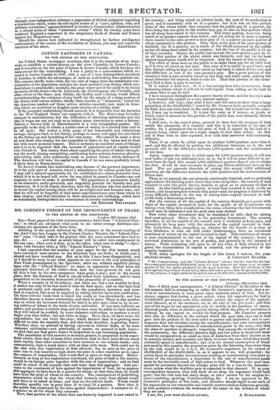COTTON FACTORIES IN CANADA.
TO THE EDITOR OF THE SPECTATOR.
An United States newspaper mentions, that it is the intention of an Ame- rican to establish a cotton-factory on the river Chambly, in Lower Canada; and it remarks on the low price of labour in Lower Canada, which has been the inducement for the undertaking. I was a party to a conversation which oc- curred in Lower Canada in 1841, with a son of a very distinguished merchant in London, in which the advantages of such an undertaking were pointed oat. The reasons chiefly were—first, the low rate of wages, from the remarkable con- centration of the population, and also the short period of year during which out- doorlabour is practicable ; secondly, the great water-power for mills to be found on nearly all the rivers—the St. Lawrence, the Chateaugnay, the Chambly, and other rivers to the East ; and, thirdly, the facility such a factory would afford, notwithstanding the existence of any tariff, for the supply of a large portion of the States with cotton articles, chiefly those known as " domestics," suited for the American market—of those cotton articles especially now made in Ame- rica which are preferred to English-made articles of a similar kind. If the proposed undertaking should succeed, it is impossible that the factories in the New England States can compete with it. The States may hereafter compete in manufactures, but the difficulties of obtaining subsistence and the rate of wages are not yet such as to induce many Americans to enter a factory. Indeed, a factory-lady in Massachusetts is a very independent person. She generally seeks only to obtain a certain sum of money in a limited time and to be off again. She makes a little purse of her honourable and industrious savings, and goes back to her family, perhaps to marry and apply her own funds to the fitting-up and furnishing of her own home. She cannot be made a slave of, and those who employ her are compelled to listen to her terms and to treat her with much personal respect. This is certainly an excellent state of things; and it is to be regretted that the increase of population and of capital should ever disturb it. But money floats about equalizing the price of labour through- out the world, forcing competition, and beating down systems, however pleasing, and setting aside laws professedly made to protect labour, which obstruct it. The American will take his capital to Canada if he can more profitably invest it there than in Massachusetts.
To Lower Canada this undertaking may become of the greatest importance. It is the only part of America where a manufactory for cotton goods has what I may call a natural opportunity for its establishment—where protective laws, which it is to be hoped will never for any object be passed in Canada—are not requisite in order to make it profitable. The population is permanent, kindly in its character, easily-governed, and singularly grateful for friendly and just treatment. It is to be hoped, therefore, that the American who has undertaken to invest hie capital among them will be an enlightened and humane man, and that be will not be forgetful of that moral superintendence over those whom he may employ, and that attention to their education and wellbeing, which have fp remarkably distinguished his countrymen in similar undertakings.
Ax ENGLISH TRAVELLER.


























 Previous page
Previous page